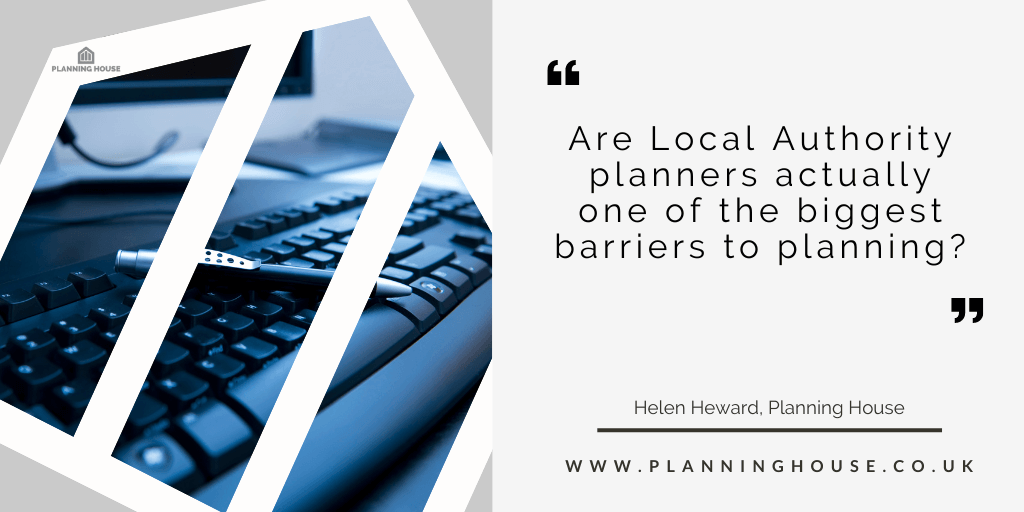Having recently given a talk to surveyors about the ‘barriers to planning’ it was staggering to hear the feedback that the general consensus that Local Authority planners are actually one of the biggest barriers to planning. As an ex-local authority planner myself I felt quite defensive of this stance but hearing peoples experiences and being honest about my own dealings with planning departments it is certainly getting more difficult to defend.
Anyone who has read anything I have previously written is aware that I am a huge advocate for pre-application engagement. I do appreciate that in order for it to be meaningful, it requires both sides to fully engage, which I must reluctantly agree doesn’t usually happen. The common response to my suggestion to submit any pre-application enquiry is that it is expensive, delays what will ultimately be the consideration of an application (as the response that comes back is usually pages of ‘policy blurb’ with little consideration) and that trying to get a meeting with a planner ahead of a formal submission is nigh on impossible. As much as I hate to admit it, generally this is my recent experience of pre-application feedback making it increasingly difficult to advise applicants to spend their time and energy on a submission.
From my perspective the main benefit of receiving a pre-application submission when I was in the local authority planning department was that it gave time, without the pressure of a determination deadline to identify problems and genuinely look for solutions. On so many occasions this worked!! A formal application would generally be amended, or at least a negotiated version would be and then submitted. It meant that applications were then relatively (not always) smoother sailing and shock horror most applications were determined ON TIME!
It appears that gone are the days of being able to sit down face-to-face with a planning officer to discuss and negotiate issues. Even when a meeting is paid for as part of the pre-application process officers are reluctant to say the least! I am increasingly finding that officers decline meetings and responses comprise planning policy (which let’s face it anyone with the internet could find), a list of consultee comments with little or no consideration of how to address any concerns or which issues are significant enough to be reasons for refusal and zero consideration of the scheme. It’s difficult to be able to justify the costs of this to applicants/developers.
This doesn’t even take into account the frustration as a result of delays in the system. I recently chased a pre-app submission, having been ignored for more than 6 months, by contacting the assistant director. The planning officer responded that day expressing thanks that the matter had been highlighted to the assistant director. This did seem genuine as the officer advised me that the pressure on the officers had been reported, but nothing had been done to address the lack of staff or time to train new staff! Instead priority is placed on determining applications and relying on extensions of time.
Some Councils no longer accept pre-application enquiries because the pressure from the number of applications per officer is just too much. With officers reporting in excess of 100 applications each it’s no wonder really that Extensions of time are the norm!
This might explain why the general consensus is that the best officers leave, what would be the motivation to stay under that amount of pressure. Understandably this is then a vicious cycle with new planners joining the profession not being taught how to fully consider applications and engage rather fire fight against the ‘backlog’. It now appears the norm that an initial response to applications is to send consultee responses directly out with no suggestions of how to address them. My most recent experience of this landscape asked for amendments which directly contradicted highway comments. The planning officer would not provide any consideration or advice on which was a priority rather it was for the developer and design team to find a solution. At least the standard ‘proactive engagement’ informative on ALL planning officer reports made me smile!!!
So what can we do about it? My sceptical side says Individually very little! I now only sign extensions of time where they are justified, when negotiation has taken place which has caused unavoidable delays. Signing just because the officer hasn’t had time to look at an application masks the problem.
When researching my ‘Barriers to Planning’ presentation the limited spending on planning which is supposedly identified by government as a ‘vehicle to deliver real meaningful change’ according to the levelling up and regeneration bill is nothing short of disgraceful! Addressing the lack of proper resourcing would be a good start. Increased spending on planning policy, ring fencing planning fees might also be a decent suggestion. I don’t believe any planner joins the profession to be a ‘paper pusher’ unfortunately my recent experience shows me that this IS increasingly the case. Properly resourcing planners, giving the profession the respect it deserves might help with staff retention and maybe would help with a positive cycle of recruitment in order to provide opportunities to train new planners to consider proposals properly. Until that’s done it’s hard to argue against that the planning system is a barrier to development.


